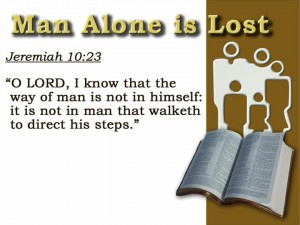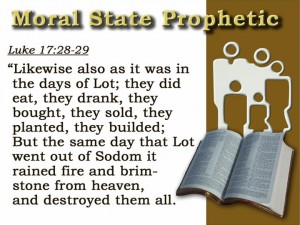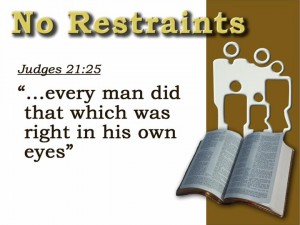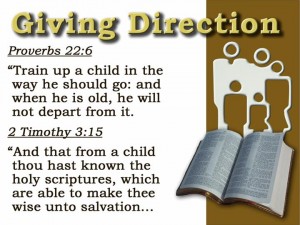A The Principle of Fellowship
 As disciples, committed to our Lord Jesus Christ, we view the world around us in a different light. The world (by which we mean whatever social order we live in) we now see operates by different principles. Whether democratic, communist or autocratic, the laws are made and administered according to the decisions of men. Today in the western world, we see many long-established laws being overthrown. The laws of God (once understood as summarised in the Ten Commandments) are no longer revered. Humanism is the popular system. Humanism began in an endeavour to throw off the oppressive feudal system and allow men and women right of choice. This had great benefits in many spheres, for people were permitted to read the Bible and follow their own conscience, not only in religious matters, but in political and other areas. However, humanism teaches that humans are the all important factor, and do not have to consider any religious conscience which is seen as being “imposed” upon them. The right of the individual is paramount. Therefore the theory of humanism is fatally flawed. It leaves the Creator completely out of human consideration. In the last few years, it has become abundantly apparent that the pendulum has swung from personal choice (the first platform of humanism) to personal licence. There is no longer any moral restraint. In fact films and books are publicly advertised and viewed containing degrading and offensive material which stretches the limits of what is allowed.
As disciples, committed to our Lord Jesus Christ, we view the world around us in a different light. The world (by which we mean whatever social order we live in) we now see operates by different principles. Whether democratic, communist or autocratic, the laws are made and administered according to the decisions of men. Today in the western world, we see many long-established laws being overthrown. The laws of God (once understood as summarised in the Ten Commandments) are no longer revered. Humanism is the popular system. Humanism began in an endeavour to throw off the oppressive feudal system and allow men and women right of choice. This had great benefits in many spheres, for people were permitted to read the Bible and follow their own conscience, not only in religious matters, but in political and other areas. However, humanism teaches that humans are the all important factor, and do not have to consider any religious conscience which is seen as being “imposed” upon them. The right of the individual is paramount. Therefore the theory of humanism is fatally flawed. It leaves the Creator completely out of human consideration. In the last few years, it has become abundantly apparent that the pendulum has swung from personal choice (the first platform of humanism) to personal licence. There is no longer any moral restraint. In fact films and books are publicly advertised and viewed containing degrading and offensive material which stretches the limits of what is allowed.

We therefore have to make a choice. Our relationship to Christ means that we do not belong to the world. When Christ prayed for his disciples shortly before he died, he prayed earnestly for their welfare. “I pray not that you should take them out of the world, but that you should keep them from the evil. They are not of the world even as I am not of the world” (John 17:14-16) The word “world” is the Greek word ‘kosmos’ which means “social order or arrangement”. From it we get such words as ‘cosmopolitan’.
The same Greek word “kosmos” is used in 1 John 2: 15-17: “Love not the world neither the things in the world. If any man love the world, the love of the Father is not in him.“ (1 John 2:15-17). It is impossible to love two activities that are opposed to each other. John goes on to say, in verse 16, that the lusts and temptations come from the world; in fact they are promoted by the world (as modern advertisements demonstrate). In the final analysis, the world (the present social order) will pass away when Christ returns (verse 17). He will take over the kingdoms of the world (Revelation 11:15), and we will only survive those judgments if we are found to be “doing the will of God”. If we are following the ways of the world, we will DO what the world says. James, the Lord’s half-brother, says it more bluntly “friendship of the world is enmity with God.” (James 4:4). This brings us back to the events in the Garden of Eden. When sin entered the world, a thinking arrived which was in opposition to God, which divided people into two categories: “the seed of the woman” (who spoke the truth, Genesis 3:3) and the “seed of the serpent” (who spoke a lie, Genesis 3:4,5 cp Romans 8:3-7 and Lesson 1).
 If we are to “Let our light shine before men…” (Matthew 5:16), then how can we be involved with the things of darkness; how can our attempts to live rightly be contaminated by evil practices? So Paul argues that we must come out from worldly associations, and not engage in idolatry (2 Corinthians 6:14-18; Revelation 18:4). The implication, in 2 Corinthians 6, is that unless we DO “come out from among them” we will not be received by God, and we cannot be His sons and daughters, because His children “do the will of my Father in heaven” (Matthew 12:50). Unless we make a concerted effort to read and practise the will of God, we will be ensnared by the world. The “cares of this life” as Jesus warned will simply take us over (Luke 21:34).
If we are to “Let our light shine before men…” (Matthew 5:16), then how can we be involved with the things of darkness; how can our attempts to live rightly be contaminated by evil practices? So Paul argues that we must come out from worldly associations, and not engage in idolatry (2 Corinthians 6:14-18; Revelation 18:4). The implication, in 2 Corinthians 6, is that unless we DO “come out from among them” we will not be received by God, and we cannot be His sons and daughters, because His children “do the will of my Father in heaven” (Matthew 12:50). Unless we make a concerted effort to read and practise the will of God, we will be ensnared by the world. The “cares of this life” as Jesus warned will simply take us over (Luke 21:34).
B The Disciple as a Stranger and Pilgrim
 This means that we don’t really belong here. We might own a house, work and send our children to school in whatever area we live. But we don’t have the same ambition and hopes as other people, because we are living for Christ, and waiting for his return.
This means that we don’t really belong here. We might own a house, work and send our children to school in whatever area we live. But we don’t have the same ambition and hopes as other people, because we are living for Christ, and waiting for his return.
Jesus taught that his disciples could only be involved in politics or defence IF his kingdom was of this world (kosmos again) John 18:36. The fact that the kingdom of Christ is NOT related to the present time, means that we cannot be involved in the politics of the world.
There is a fine balance to keep. One of the best examples is in the life of Abraham. God made promises to Abraham which constitute the gospel (Lesson 5). Abraham was also called the “Friend of God” (James 2:23). He was promised the land for an inheritance, yet he never received it (Acts 7:5). How then did he conduct his life? He lived in the land promised to him, but lived as a “stranger and a pilgrim” (Hebrews 11:13-16). In other words, he lived in the land, but did not take part in its wordly activities. In fact, though a wealthy man, he remained living in a tent as a witness that he was not part of the world. “By faith he sojourned” (Hebrews 11:9) and “looked for a city… that God would build” (Hebrews 11:10). This is the new city of Jerusalem which will be the capital of the world, the administrative and religious centre for all nations (Micah 4:1-4) “the city of the great King” as Jesus described it (Matthew 5:35).
For this reason, no disciple ever got involved in politics or in reform, despite some dreadful conditions that we wouldn’t accept today. They accepted their lot in life, and looked for the coming of the Lord. This was the practice of the early believers.
C Submission to the State but Subject to Christ
Our allegiance is to Christ – we are future administrators of his government (2 Timothy 2:12; 1 Corinthians 2:12; Revelation 2:26,27). Christ has promised that he will appoint his 12 disciples to positions of rulership (Matthew 19:28) and also others who follow him (Luke 19:17,19). We cannot engage in the politics of this world, which God has pledged to destroy (Daniel 2:44).

Ultimately, God “rules in the Kingdoms of men, and giveth it to whomsoever He will” (Daniel 4:17) for His Purpose. This being so, voting a political party into government runs the risk of opposing God’s intentions (Acts 5:39).On moral issues, politicians make laws that disregard the Bible.
Keeping in mind that disciples are committed to the coming Kingdom of God, what is our attitude to governments? There were some ardent Russian christians who not only refused to go to war, but refused to pay taxes and acknowledge the Emperor.
MARTYRS
| 1818 | General Mouravyof wrote in his diary: “Five serfs from Tambof Government were sent to the Caucasus for refusing to serve when taken as conscripts. They said “All men are equal. The Emperor is a man like ourselves. They were exiled to the Caucasus. |
| 1827 | Nikolayef and Bogdanof of the Guards ran away from military service. When captured they refused army service as contrary to their convictions and would not be sworn in. Sentenced to a Penal Battalion |
| 1830 | George Ivanof. Claimed he had no father except Christ the Saviour and would not acknowledge the Emperor, nor civil nor spiritual governments. They died in prison. |
| 1835 | Ivan captured. Declared he did not believe in the holy saints, nor in the Emperor nor in any of the authorities. He was exiled to Solovetz Monastery. |
| 1849 | Ivan Shouroupof, 29 years of age, (in the time of Tsar Nicholas I) was on enrolment as a conscript and refused to take the oath, saying that one must serve God alone, and that he therefore did not wish to serve the Tsar and would not take the oath, fearing to perjure himself. He was confined in a Monastery. |
Despite any opinion one might hold of the present government, every believer is commanded to abide by the law, and to be blameless in personal behaviour (I Peter 2:13-15). No disciple can agitate for political or social change; this was never done by the first century believers. Peter, who was once prepared to defend his Lord against the Jewish rulership, instructs that rulers must be honoured (1 Peter 2:17 cp Titus 3:1,2).
The Lord instructed that we are to pay taxes “lest we cause an offence” (or “to cause to stumble” – we get our word ‘scandal’ from this Greek word – Matthew 17:24-27; 22:17-21). So we are not to do anything that will cause others to stumble, that will detract from the main duty of witnessing to the Word of God. For this reason, some of the Russian martyrs listed above were clearly too extreme in refusing to acknowledge the Emperor or pay taxes. However, Ivan Shouroupof was quite right not to take the oath of allegiance to the Tsar.
When do serving God and human government conflict?
In the book of Acts, the apostles ran into conflict with the Jewish authorities. Peter was taken before the Sanhedrin (70 rulers – a Jewish Parliament) and commanded not to use the name of Jesus Christ. He would not accept such restraint. Why?
Peter explains that obedience to God takes precedence over obedience to human authorities(Acts 4:19; 5:29). The disciples exercised this stand to Rome. They lived under Roman conditions, accepting slavery, convening their religious meetings often in the evenings so that believing slaves could attend (cp Acts 20:7-11 Eutychus was a hard worked slave). But when the Roman government demanded worship of the Emperor, then christians held back, and were prepared to die for their commitment.
Do we become an elected representative? No. But there are examples of those who were government servants (eg Daniel, ch 6:2; the Ethiopian eunuch Acts 8:27).
Do we vote? How can we vote for a system which does not honour God, and which God has said He will destroy?
How can we support a government that makes laws which oppose God’s clear Bible teaching?
Serving in the armed forces
Do we fight for our country? Once again, “our country” is yet to come (as Abraham looked for a city and country – Hebrews 11:10). When Jesus was arrested by the soldiers, he refused to accept defence. In fact he reprimanded Peter for using force (Matthew 26:51-53). The Kingdom of God begun with Israel (1 Chronicles 28:5) is now in recess (Ezekiel 21:25-27) and will not be restored “until he come whose right it is”. When he does come, he will doubtless use the twelve legions of angels he told Peter about (Matthew 26:53) to assist in taking the throne and rulership promised to him (Luke 1:32,33; Revelation 19:15,16).
Tragically, the established Church became more concerned with power and influence than with obedience to the Lord’s commands. By the 4th century AD, church liturgy had developed with a hierarchial structure, and men regarded as “the church fathers” such as Augustine wrote widely and were accepted as authorities in their own right. Church tradition was rapidly replacing Bible teaching.
What of social reform?
The Roman world had no social welfare. There was marked class distinction. The issue of slavery dominated. The revolt of the slaves was ruthlessly put down. However, Paul taught slaves to simply obey and be diligent (Colossians 3:22-24) and that it was part of their service to Christ. We have only to endure the present existence, exercising management in our affairs, learning to rule our own spirit (Proverbs 16:32).
In the past, God gave the nation of Israel a law which was unique among the nations in providing for social needs, part of the Law of Moses. When the Kingdom of God is restored at the return of Christ, social policy will be part of his programme (Psa 72:2-6).
We are however instructed to provide social care and mutual consideration within the household of God (Acts 6:1-3; 1 Timothy 5:1-10). This meets social concern within the ecclesia – the national welfare will not be our concern until the nation comes under the dominion of Christ.
Attitude to employers
In this era of human rights, the demands of employees run counter to the disposition that a disciple of Christ ought to foster. Obedience and personal diligence in employment are commanded (Colossians 3:22-25). Here in Colossians the word “servants” is “bondslaves”. The ‘employees’ were owned as slaves. This was hardly a matter of choice in vocation, yet personal demeanour was paramount for a disciple, who served any master “as to the Lord”.
Employers themselves were also under command (Colossians 4:1). They were to remember they had one who over rules them, even Christ (as with Israel’s rulers, Psalm 82). But each was to do his own duty, not to impose demands upon the other. This is the spirit of mutual submission (Ephesians 5:20 – 6:10).
D Do all to the Glory of God – The Power of Personal Witness
 How then must we conduct ourselves in the world?
How then must we conduct ourselves in the world?
- Be as lights shining in a dark world (Philippians 2:15)
- Do your duty – Do not demand your rights (Ephesians 5:20 – 6:10)
- “Whatsoever state I am in, therewith to be content” – Paul (Philippians 4:11). Some disciples are in very comfortable situations. Others have a terrible struggle, even for day to day survival. We can only do what our circumstances allow and the greatest thing we can do is to be a living example of the power of God in our lives (2 Corinthians 4:6). If we are always complaining about our lot, then we are neither grateful for the few blessings we do have, nor are a happy reflection of the work of God in us.
- Serve your masters well (Colossians 3: 22-25; 1 Timothy 6:1-3). In the workplace, where we spend at least 40 hours per week, we are observed for the sort of person we are. Do we speak and behave in a manner that is a good advertisement for the Lord we claim to serve? Daniel, while an exile in Babylon, was marked out for personal diligence; so much so, that when certain people wanted to bring him into disrepute, they couldn’t find anything to criticise him for. They had to look to his religious devotion to try and ensnare him (Daniel 6:5-12).
- Moderation in dealings with others (Philippians 4:5 [Gk epieikeia – translated “clemency” Acts 24:4; “gentleness” 2 Corinthians 10:1] It means mildness, gentleness, kindness). This means we are not to be extreme in our language or behaviour, not out to pick a quarrel or to defend ourselves. “Agree with thine adversary quickly, while you are in the way with him..” (Matthew 5:25). The word “agree” means ‘to be in a good mind’. So be pleasant and work in whenever it is possible; other people have ways of doing things as well that we need to consider. Otherwise, as Jesus shows, our abrasive, awkward manner will irritate those with whom we deal and could lead to serious charges.
- Speak graciously. Coarse and careless language should not be indulged (Ephesians 4:29)
-
Be known for honest conduct (1 Peter 2:12). Let everything you do be above reproach.
-
Duties not Rights (Ephesians 5:20 – 6:10) The Bible teaches not human rights, but human duties, placing the emphasis on what we ought to do for God and for each other. Human rights ends up demanding, placing the emphasis on self, ‘what I want or ought to have’. The Bible teaching takes the thought away from self and places it upon God.
* Wives are to submit
* Husbands are to seek their wife’s interest, in a sacrificial manner, above their own personal interest
* Children are to obey
* Parents are to nurture
* Employees to serve, diligently
* Employers to be just and not to threaten
None is permitted to demand of another. The remarkable thing is that when we sort out our own behaviour, it always produces a response from others. We become so much easier to live with and to get on with.
The over-riding principle of Discipleship
¨ To see ourselves as a learner, one who follows (1st lesson)
¨ “Whatever you do, do all to the glory of God” (1 Corinthians 10:31) because the focus of our life is upon Him.
¨ We have been created in the “image and likeness of God” (Genesis 1:26) – We are then to walk within this creative guideline – we are to be “conformed to the image of the Son” (Romans 8:29).
¨ When God looks upon us, what does He want to see? Simply this: A reflection, be it so small, of Himself (2 Corinthians 4:5).




